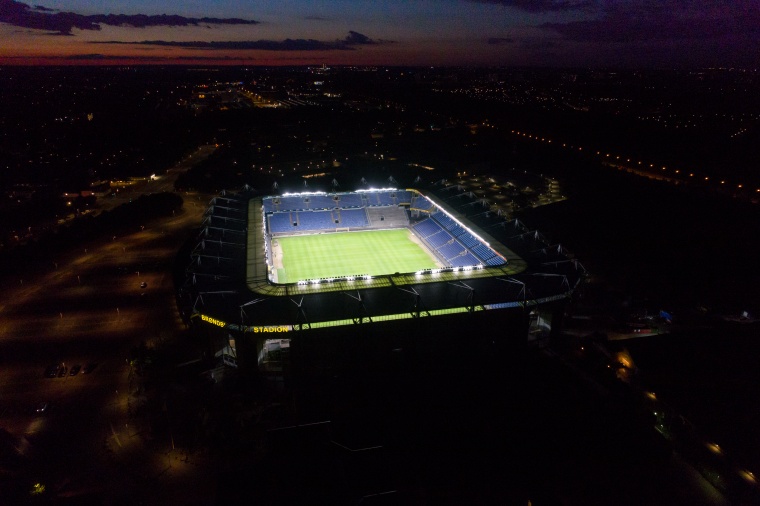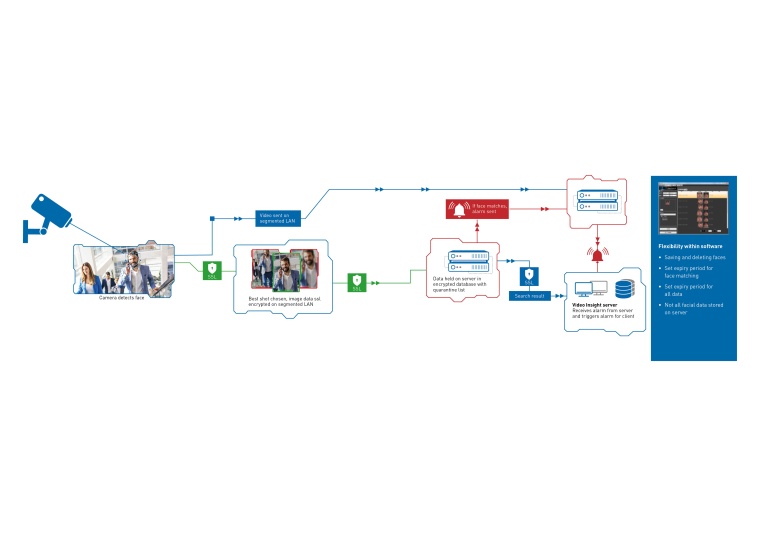Stadiums: Fan Safety Improved Through Facial Recognition Technology
Who could ever forget their first visit to a big stadium football match? The crackle of excitement in the air like an electrical charge as you walk to the stadium with friends and ...


Who could ever forget their first visit to a big stadium football match? The crackle of excitement in the air like an electrical charge as you walk to the stadium with friends and family; an army of supporters marching in the matching colours of your team. The buzz as you queue to pass through the turnstiles and the first view of the pitch as you emerge into the floodlights of the stadium and the cacophony of chants from the home and away fans.
As the most popular sport in the western world, football has long been hailed as the game of the people. But live television coverage and the danger of partisan support spilling over into violence has threatened to put off many from attending games at stadiums across Europe. Now professional football clubs are fighting back. Stadiums are once again becoming safer and more enjoyable experiences for fans with the use of the latest facial recognition technology.
Danish Football Leads Way
The Danish Superliga football club Brøndby IF is leading the way. They were aware that family attendance had fallen at some of the more high-profile games, such as the local derby with F.C. Copenhagen, due to concerns over hooliganism and safety. With an average attendance of 14,000 people per game, and up to 100 registered persons on the stadium blacklist for causing trouble, the football club wanted to find a way to make genuine fans feel safer by preventing problems before they could occur.
With the use of cameras and facial recognition, blacklisted offenders can now be automatically identified in the crowd before they attempt to enter the stadium. This system identifies any individuals registered on the offenders list and alerts security staff to prevent them from entering. The automated procedure at the stadium entrance also decreases congestion at the gates, so genuine fans can get into the stadium faster. As well as improving security outside, the system allows staff more time to focus their attention on creating a safe and entertaining environment for those inside the stadium.
Brøndby IF’s former CEO Jesper Jørgensen commented about the introduction of the new system: “As the first company in Denmark, we have been authorized by the authorities to use facial recognition technology in a number of new cameras that we have installed at Brøndby Stadium. The system will significantly increase our efficiency in identifying quarantined people at our entrances, and thus, we can better ensure that quarantine frames do not enter our battles. Historically, we have been dependent on our guards being able to recognize the people who are on our quarantine list, and even though our guards are skilled, it is not an easy task to remember and appoint quarantined people when we, as us, have on average approximately 14,000 people per game passing through the entrances in a relatively short time.”
Most Accurate
The Panasonic facial recognition software ensures high levels of accuracy. The technology can identify faces that are difficult to recognise with conventional techniques, such as those taken from an acute angle and even when part of the face is concealed or hidden by sunglasses or scarves. In fact, the National Institute of Standards of Technology (NIST) in independent testing identified the system as the most accurate facial recognition server on the market. The system was first used during a game in July and has already proven to be successful as Brøndby IF prevented one person who was on the quarantine list from entering the stadium.
Protection of Personal Data
However, some fans initially were sceptical about the scheme. They had concerns about privacy and personal data protection. These fears quickly faded once the club explained the sensitive way that the scheme had been implemented. Personal data privacy is protected because the facial recognition technology does not store the images or data of any supporters, other than those registered on the blacklist. In addition, all personal data is stored on an internal server, not connected to the internet or to any other system, significantly reducing any cyber risk of data breach.
It is important to know that the new technology supports the process, but still humans have to make the decision and only Brøndby IF-authorized personnel have access to the Brøndby IF server. If you are not on the quarantine list, the system will not recognize or register the person. All personal data processed as part of the facial recognition system that does not result in a match with information from Brøndby IF‘s internal quarantine list is not stored.
By describing the process transparent to the public and by ensuring that the human factor is leading the process and the technology is only supporting, both management and fans alike have welcomed the new technology. Moving forward the club is exploring the potential to connect the system to a national hooligan register to help spot travelling troublemakers within Denmark.
Huge Potential
As well as helping football remain a game for the people, this technology has huge potential in the wider sporting and entertainment industry, particularly where there are large crowds gathering or ticketing systems in place. The facial recognition system contributes to a safer and more enjoyable stadium environment by alleviating security pressure on the ground and speeding access, whilst all the time ensuring that personal privacy is protected.
“Panasonic’s facial recognition system contributes to a safer stadium environment by alleviating security pressure on the ground, while ensuring that all data is protected from unauthorised external access” said Gerard Figols, head of the European security business at Panasonic. “In turn, we can offer peace of mind to football fans and Brøndby IF that our technology will improve the standard of safety even during high profile matches, something that fans have already complimented the system for.”
Panasonic is further developing their stadium value proposition, so there are more solutions to come to enhance the fans’ experience.
Business Partner
Panasonic Business - ArchiveHagenauer Strasse 43
65203 Wiesbaden
Germany
most read

GIT SECURITY AWARD 2026 - The winners have been announced!
GIT SECURITY AWARD 2026: The best safety and security solutions of the year - now an overview of all winners


Integrated and Futureproof: Traka’s Next Chapter
Interview with Stefni Oliver on Traka’s Vision for the Future

Is Your Venue Ready for Martyn’s Law?
Martyn’s Law demands stronger security by 2027. Is your venue prepared to protect and respond?

Airbus Defence and Space: Security as a strategic pillar of Europe's defense capability
Airbus Defence and Space protects sites, technologies and employees with modern security and cyber solutions - strengthening Europe's resilience in uncertain times








